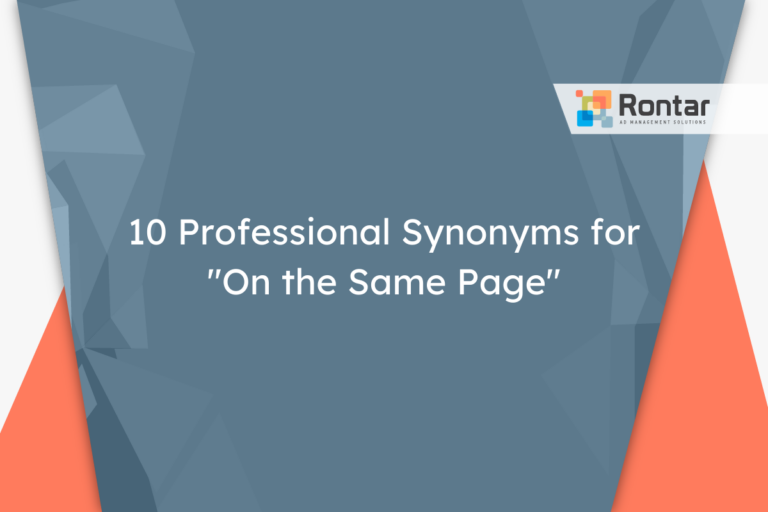10 Synonyms for “At Your Convenience”

Finding the right way to ask for someone’s time without sounding demanding can be tricky, especially in a professional setting. “At your convenience” is a common phrase used to do just that, but it’s not the only option.
This article lists 10 alternatives to help you communicate flexibility and respect for the recipient’s schedule. Each alternative is dissected to show you when and how to use it most effectively in your emails or messages.
Is It Professional to Say “At Your Convenience”?
Using the phrase “at your convenience” in your communication is often seen as professional, formal, and polite. It’s a way of showing respect for the recipient’s time and schedule, indicating that you are willing to wait or adjust according to what is most convenient for them.
It is most suitable to use this phrase when addressing colleagues, clients, or any professional contacts. This phrase is especially useful in business emails, letters, and other forms of professional correspondence.
Email example:
Dear Mr. Thompson,
I am writing to discuss the details of our upcoming project. Could you please provide your feedback at your convenience? I'm looking forward to hearing your valuable inputs.
Best regards,
Emily Sanders
Pros and cons of using “at your convenience”:
Pros:
- Shows respect for the recipient’s time
- Enhances the politeness of your request
- Increases the perception of your professionalism
Cons:
- May be interpreted as too passive in some situations
- Could be seen as vague without a specific timeframe
- May not convey urgency effectively
While “at your convenience” is widely accepted and appreciated, someone might consider using an alternative phrase to avoid vagueness or to convey a sense of urgency more clearly.
10 Other Ways to Say “At Your Convenience”
When seeking a different way to express flexibility in timing, consider these common alternatives:
- When it suits you
- Whenever you’re ready
- At a time that works for you
- As per your availability
- When it’s convenient for you
- At your earliest convenience
- In your own time
- When you have a moment
- At a time of your choosing
- Whenever it’s convenient for you
1. When it suits you
This alternative is very similar to “at your convenience” but can be perceived as even more polite and flexible. It puts the emphasis squarely on the recipient’s schedule and priorities. This phrase is ideal for use in professional emails or messages where you want to be especially considerate of the other person’s time.
This option is best suited for emails to colleagues or clients, especially when requesting something that requires thoughtful input or action. Because of its courteous tone, it works well in both formal and semi-formal correspondence.
Email example:
Dear Lisa,
I would appreciate your feedback on the report I sent you last week. Please review it when it suits you and let me know your thoughts.
Kind regards,
Mark Anderson
2. Whenever you’re ready
This version adds a casual yet polite touch to your message, suggesting patience and a lack of pressure. It’s a good choice for professional contexts where you have an established rapport with the recipient or when the task isn’t urgent.
It shines in situations where you want to reassure the recipient that their convenience is your priority, making it appropriate for both internal and external communications. This is especially true in emails or messages where you want to balance formality with a friendly tone.
Example:
Dear Tom,
I've attached the documents you requested last meeting. Feel free to review them whenever you're ready.
Best,
Sophia Lee
3. At a time that works for you
This alternative stands out by being both professional and considerate, making the recipient feel respected. It’s slightly more formal than the original phrase but still maintains a warm tone.
This phrase is particularly useful in communications with clients or higher-ups, where showing respect for their time and commitments is crucial. It’s perfect for emails or messages that need to hit a formal yet accommodating note.
Email sample:
Dear Dr. Peterson,
I’m writing to schedule our next meeting. Please let me know at a time that works for you.
Regards,
Julia Hansen
4. As per your availability
This synonym is slightly more formal and directly addresses the recipient’s schedule. It effectively communicates your willingness to accommodate their timetable, making it well-suited for professional and formal contexts.
Best used when organizing meetings or appointments, especially with recipients who have a busy schedule, such as executives or external partners. It’s an excellent choice for emails that aim to be considerate of the recipient’s time constraints.
Here’s an example:
Dear Megan,
I would like to discuss our new project strategy with you. Let’s arrange a call as per your availability.
Sincerely,
Derek Smith
5. When it’s convenient for you
Very close to the original phrase in both tone and meaning, this alternative is universally polite and adaptable to various professional situations. It acknowledges the importance of the recipient’s time without assuming urgency.
This phrase is particularly effective in emails to colleagues or clients where you wish to be deferential yet clear about needing their input or action. It’s a great choice for correspondence that requires a respectful but formal approach.
Example:
Dear Mr. Davidson,
Please review the attached contract revisions when it's convenient for you and share any feedback.
Warm regards,
Elena Morris
6. At your earliest convenience
This alternative conveys a sense of urgency more than the original phrase, yet it remains polite and professional. It subtly requests prompt action without being demanding, making it suitable for time-sensitive matters.
When you need a task completed soon but want to avoid sounding too pushy, this phrase is ideal. It works well with both formal and semi-formal emails, especially to colleagues or clients familiar with the urgency of business operations.
Here’s an example:
Dear Caroline,
Could you please send me the final version of the presentation at your earliest convenience? Thank you in advance for your prompt response.
Best wishes,
Oliver Grant
7. In your own time
This synonym provides a relaxed, polite alternative, implying that the recipient has complete control over the timing. It’s less formal than the original phrase, which can help foster a friendly atmosphere in your communications.
It’s especially suited for interactions with team members or colleagues in a more informal setting. This phrase is perfect when the task is not urgent, promoting a stress-free environment for the recipient to respond or act.
Email example:
Dear Alex,
I’ve drafted the newsletter for next month. Please, take a look in your own time and let me know your suggestions.
Cheers,
Jordan
8. When you have a moment
This is a casual yet polite way of asking for someone’s time, indicating that there’s no rush. It’s good for creating a professional yet informal tone in your message, signaling flexibility and consideration for the recipient’s workload.
This phrase is most effective in an informal or semi-formal email, particularly to colleagues or contacts with whom you have a friendly relationship. It’s an excellent choice for non-urgent matters that require attention.
Example:
Dear Jenna,
I’d love your input on the project plan. When you have a moment, could you give it a quick look?
Thanks,
Ian
9. At a time of your choosing
This option elevates the flexibility offered to the recipient, making it a very polite and accommodating choice. While it is professional, it also conveys a high level of respect for the recipient’s autonomy in deciding when they would like to proceed.
This phrase is particularly suitable for formal invitations or requests to high-level executives or important clients. It ensures that the recipient feels valued and in control, ideal for emails where discretion and courtesy are paramount.
Email sample:
Dear Professor Hill,
We are planning a meeting to discuss the upcoming project milestones. I would be honored if you could join us at a time of your choosing.
Kind regards,
Natalie
10. Whenever it’s convenient for you
This is a gentle, polite alternative that mirrors the intent of the original phrase by offering maximum flexibility to the recipient. It’s a great fit for both professional and formal settings, suggesting that the sender is considerate of the recipient’s schedule without imposing urgency.
Suitable for a wide range of professional conversations, including requests for meetings, feedback, or information. It’s well-adapted to communications where you wish to be as accommodating as possible without forfeiting formality.
Email sample:
Dear Vanessa,
Could you provide your insights on the draft proposal whenever it's convenient for you? Your expertise would be greatly appreciated.
Sincerely,
Gregory
Final Thoughts
Choosing the right words can change how your message is received. The alternatives to “at your convenience” provided here offer flexibility, showing respect for people’s time in various professional settings. Experiment with these options to find the best fit for your emails and messages.






